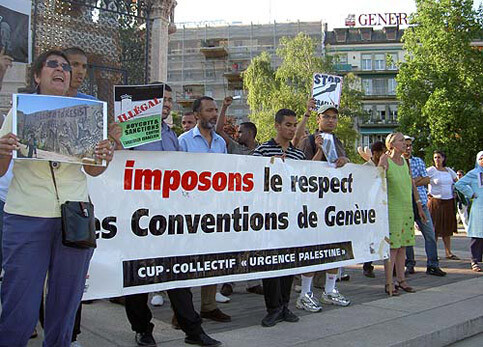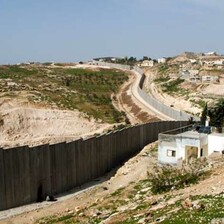Electronic Lebanon 18 July 2006

Activists in Geneve call for the respect of the Geneva Conventions at the Brunswick garden, in front of the Israeli embassy. (CUP)
During the course of the G8 Summit meeting in the European city of St. Petersburg, world leaders have been forced to address the crisis in the Middle East caused principally by Israel’s military aggression, both in the Occupied Palestinian Territories and in Lebanon. While the response of the United States has been predictably devoid of criticism against Israel, messages coming from the European Union appear to be taking a different turn. Time will tell whether Israel’s current atrocities will generate more than just strong words. But history can be shaped as well. Just as what happened in the 1980’s concerning apartheid South Africa, Europe, its leaders and its citizens must take the opportunity to raise their voices against injustice and oppression.
Breaking new diplomatic ground?
The United States has continued to maintain that Israel has the right to self defence and while it mutters the word “restraint”, there seems no limit to how much military force will be tolerated towards this end.
By contrast, the European Union (EU) on 7 July 2006 condemned the loss of life caused by the disproportionate use of force by the Israeli Defence Forces and the resulting humanitarian crisis. It was the first time the EU, a bloc of 25 nations, had made such a sharp criticism of Israel.
The statement reflected mounting public concern in Europe, which echoed in a fierce debate that took place in the European Parliament on 5 July 2006. Switzerland had already stated on 3 July that some of Israel’s actions in the Gaza Strip constituted collective punishment, an act that is explicitly forbidden under the 1949 Geneva Conventions.1
Prime Minister of Finland, Matti Vanhanen later clarified in an interview with BBC World on 17 July 2006 that the common statement of the G8 was a compromise to overcome differences of opinion. Finland holds the EU presidency until the end of 2006. It is therefore in a strong position to bring forward the voice of the European citizens to the United Nations and the Bush administration.
Moral and legal obligation to act
On 9 July 2004, at the request of the United Nations, the International Court of Justice in The Hague issued an Advisory Opinion on the legal consequences of Israel’s construction of a wall in the Occupied Palestinian Territories. It is important to recall that the Court’s Opinion did not create any new obligations, it simply confirmed existing ones.
The Court declared that Israel stop its violations of international law, which it said included human rights and humanitarian law violations against Palestinians in the Occupied Territories. The Court pointed out that signatories to the Geneva Conventions of 1949 (including The Netherlands) also had “additional obligations to ensure Israel’s compliance” with the Conventions.2
While Israel’s violations have continued to be raised, mainly in the United Nations, powerful governments have only issued private protests, if at all. Two years after the Advisory Opinion, there continues to be a reluctance to openly and strongly condemn Israel’s violations of international law.
Turning point?
Israel’s use of disproportionate force - a qualification of the EU - may become a turning point. Israel’s devastating and disproportionate attacks on Gaza and its intensive, illegal bombing of civil infrastructure in Lebanon like bridges, roads, the airport, the harbour, petrol stations, and a light house may prove to be steps too far.
The response of civil society in South Africa was very strong. At a media conference at COSATU House on 10 July 2006 the president of COSATU, Willie Madisha, together with the General Secretary of the South African Council of Churches, Eddie Makue and the Palestine Solidarity Committee’s, Salim Vally issued a joint statement: “We, delegates of organisations and movements that represent and have the support of the majority of South Africans, oppose and condemn the Israeli atrocities in Palestine.” The statement then called for the ending of diplomatic relations between South Africa and Israel and for “a strong, forceful and determined boycott and sanctions campaign against the Israeli apartheid state”.3
Earlier, Madisha issued a statement in support of Canadian CUPE trade union’s call for a boycott of Israel:
As someone who lived in apartheid South Africa and who has visited Palestine I say with confidence that Israel is an apartheid state. In fact, I believe that some of Israel’s actions make the actions of South Africa’s apartheid regime appear pale by comparison. … We cannot remain silent any longer. It is time to stand in word and in deed with the peoples of the Middle East and heed their call to support the struggle against occupation. There will be no peace in this region and in the world, without justice.4
In a few years time we can analyse if this moment can be compared with the Soweto uprising on 16 June 1976, when the South African government used extreme force against peaceful demonstrations of school youth. It was a turning point in the sense that it brought about a change in public opinion in Europe. The shooting of over 200 school children in Soweto revealed the brutality of the apartheid regime. After the events, European citizens took part in demonstrations to put pressure not only on South Africa, but also on their own governments to bring an end to the apartheid regime.
Demonstrations all over Europe
The response of civilians in Israel came within two weeks, including several demonstrations that took place in Israel on Sunday 16 July. The largest demonstration was in Tel-Aviv where more than 600 people came to protest against the war.5
In Europe, there was a stream of protests against the violence of the Israeli military forces in Gaza, the kidnapping of Ministers and Parliamentarians of the Palestinian Authority and the Palestinian Legislative Council (who are now held as hostages), and then the attacks on Lebanon, all of which started from early July. There were, and will be, demonstrations in several cities all over Europe.
In the United Kingdom6 demonstrations took place in Hull, Liverpool, Birmingham, Manchester, and London. Demonstrations also took place in Switzerland, in Bern and Geneva7; in the Netherlands in the Hague; in Sweden in Stockholm8; in Italy in Ancona; in Turkey in Istanbul9; in France in Paris; in Ireland in Dublin, in Spain in Bilbao and in Greece in Athens. National demonstrations are planned on 22 July in Amsterdam, London, Goeteborg, Bern and on 29 July in Paris. In each of these countries, most solidarity groups have websites and list-servers that post information about demonstrations.
The public opinion worldwide seems to be changing. An on-line poll by CNN asked “Do you think the Israeli military response inside Lebanon is justified?” At 1 pm (Dutch time) on 18 July 2006, out of a total of over 600,000 votes, more than half (52%) responded “no”, that the attacks were not justified.
Encouragement
Every single person who takes to the streets in Europe against Israeli atrocities sends a message of encouragement to the Palestinian people.
After receiving a desperate message from a friend in the Occupied Palestinian Territories we replied by sending information about the activities in Europe. We received the following response:
“Thank you for your words of strength. It is important to hear words of strength and belief in change as my tongue is numb, my heart aches and I can no longer write. I am so tired - just so tired of this madness and the lack of respect for human life. I was always taught that human life is precious but I only see the opposite. I do have hope though at this point I feel quite helpless and angry. I hope that the voices of the ordinary people will begin to sink in into the minds of power-ridden and interest-absolved governments.”
Europe should act
Much remains to be done before European States can be said to be in compliance with international law. In all their contacts with Israel, States must emphasise the imperative need of compliance by Israel with international law, which includes compliance with the advisory opinion, and of the dangers of continued non-compliance. States must hold Israel to account by taking concrete measures in the event of further non-compliance.
The disproportionate use of violence, collective punishment, killing and wounding of civilians, and the destruction of civil infrastructure are all breaches of the Geneva Conventions. They are serious violations of international law and provide ample legal justification, and a strong moral duty, for States to impose measures that punish Israel for its actions. This is exactly what the international community had in mind when it spoke of the “Responsibility to Protect”.10
As was the case concerning apartheid South Africa, East Timor and other situations where there was a flagrant disregard for international law, States, and the Security Council, could persistently condemn Israel’s violations of international law and threaten to take further action against Israel if these violations continue. These could be backed up by direct, public protests of individual states and privately and publicly denouncing Israel’s continued violations of international law.
Since Israel continues to defy the international community, there are several concrete steps available, ranging from expulsion of Israeli diplomats and halting existing negotiations (for example halting arms sales to Israel from the European Union) to stopping technical assistance so long as Israel continues to violate international law by building settlements and constructing the Wall. A further measure could include the EU suspending its Association Agreement with Israel on the grounds that Israel has persistently violated the human rights clause to the Agreement.
It is imperative that Europe take immediate, concrete action. It has a moral obligation to listen to its citizens, who are voicing their concern about the outrageous attacks on Palestinian and Lebanese civilians. But there is also a legal obligation for European countries, both as signatories to the Geneva Conventions and as members of the United Nations.
For us “ordinary civilians”, we must join forces and continue to raise our voices against Israeli aggression, occupation and dispossession.
Adri Nieuwhof is a psychologist and human rights advocate. Jeff Handmaker is a human rights lawyer and researcher, also working on a doctorate at the Netherlands Institute of Human Rights at Utrecht University.
Endnotes
[1] EU condemns Israeli Gaza incursions, David Fickling, The Guardian (7 July 2006)
[2] One year on: Governments have obligations to hold Israel to account, Jeff Handmaker, Peter Malcontent and Gentian Zyberi (9 July 2005)
[3] Media Conference convened by Palestine Solidarity Committee Also reported on: ‘Apartheid Israel’ worse than apartheid SA, Mail and Guardian (10 July 2006)
[4] President of South African Trade Unions Congress: “Israel is an apartheid state”
[5] Gush Shalom
[6] PSC Events
[7] Collectif Urgence Palestine
[8] Kampanjen för solidaritet med Palestina
[9] Demonstration Held in Turkey to Protest Israeli Gaza Offensive, Xinhua (1 July 2006)
[10] ‘Responsibility to Protect, Ethical and Theological Reflections’, World Council of Churches, 2005.
Related Links





